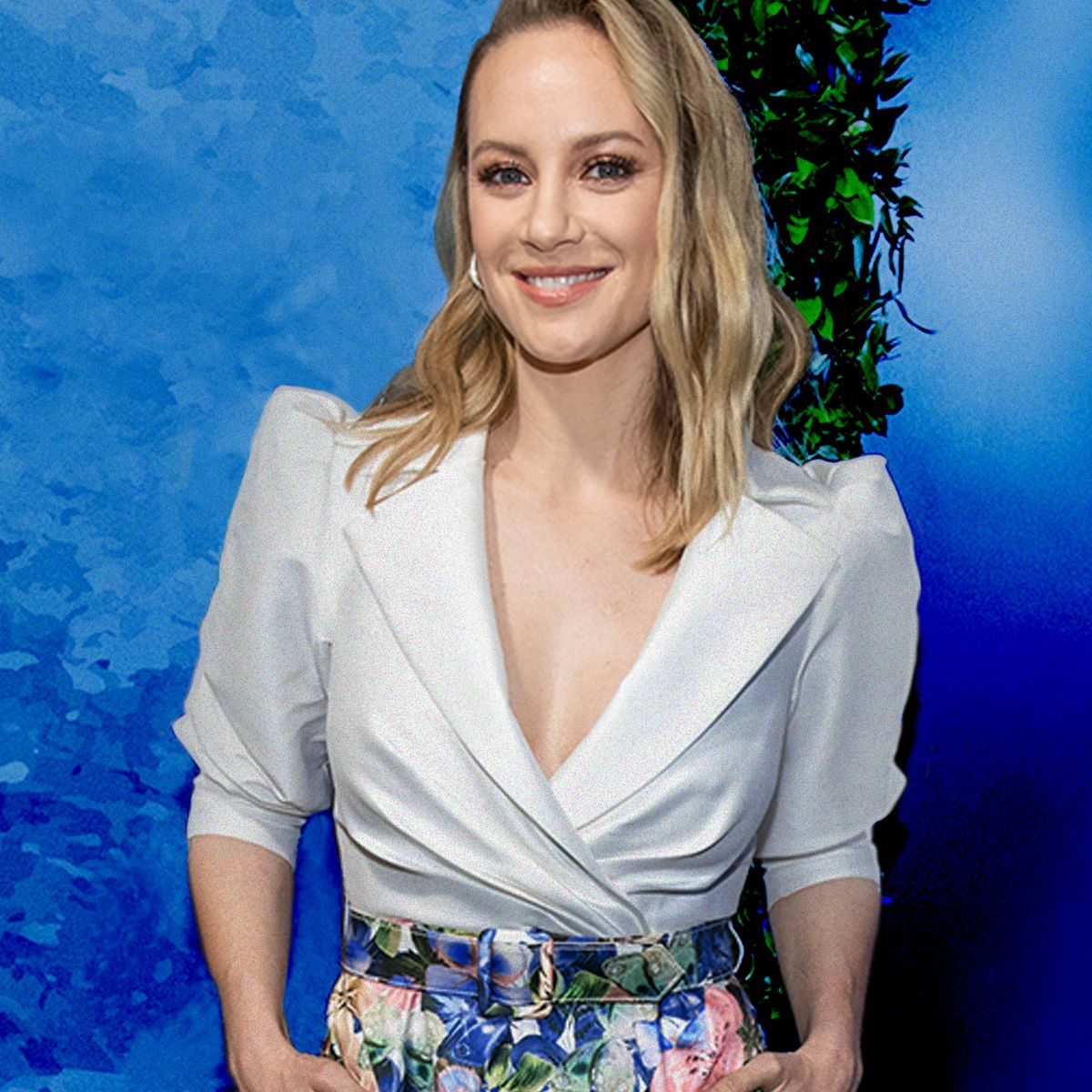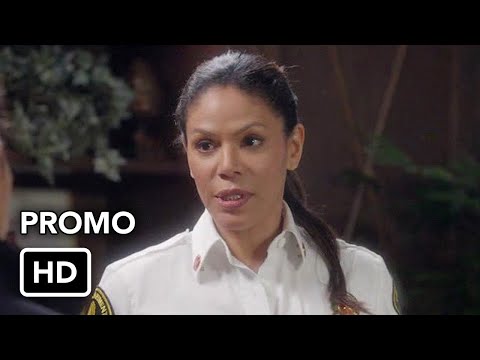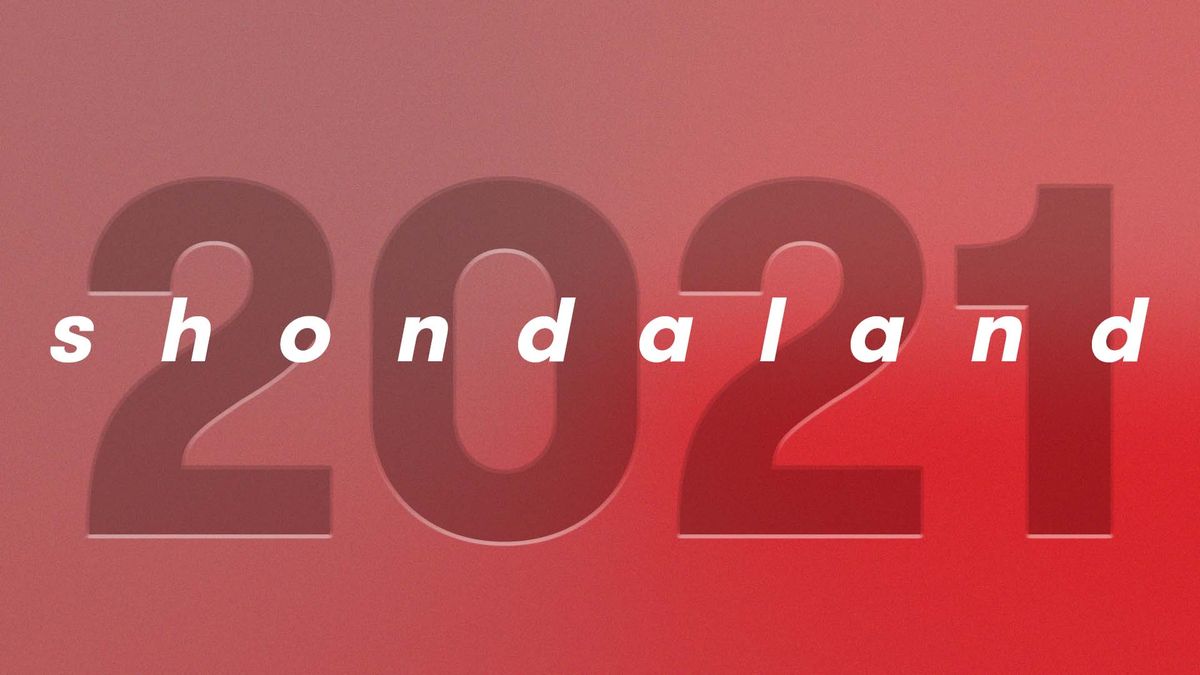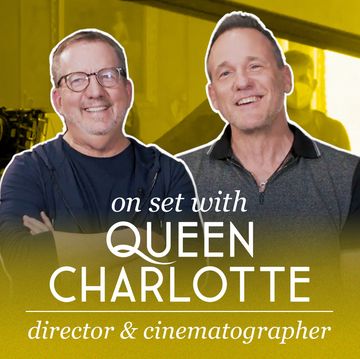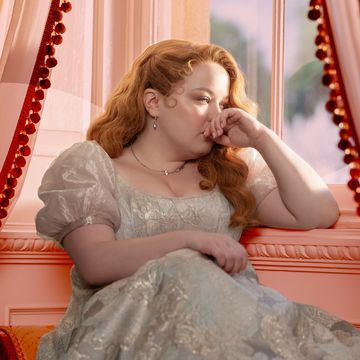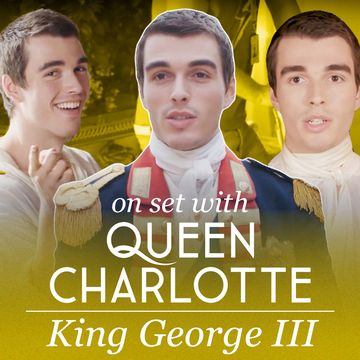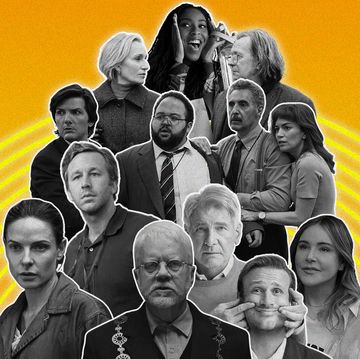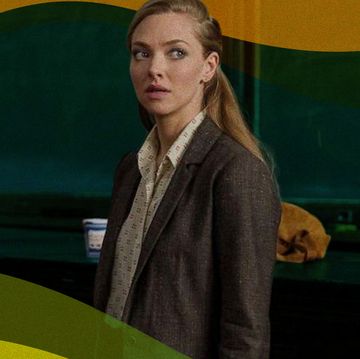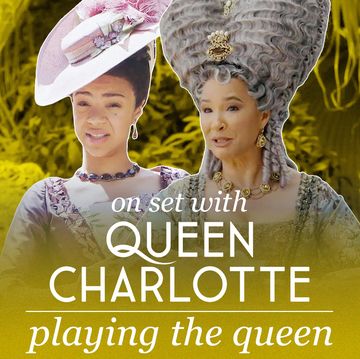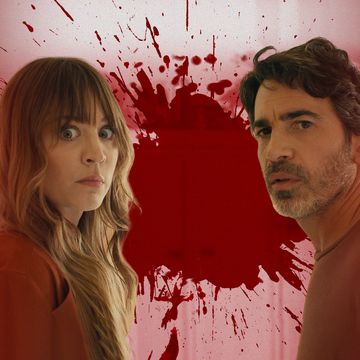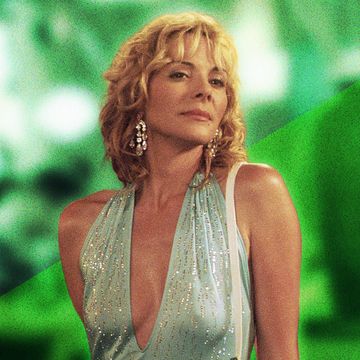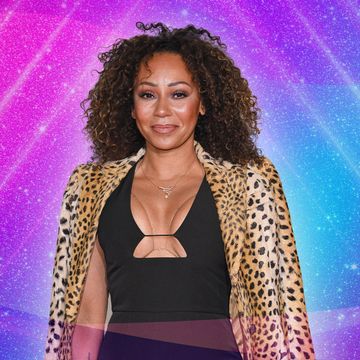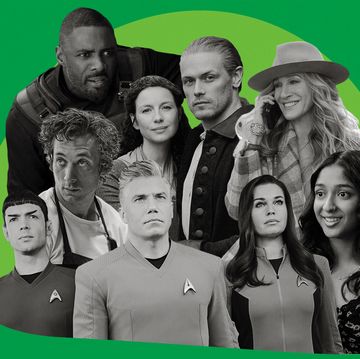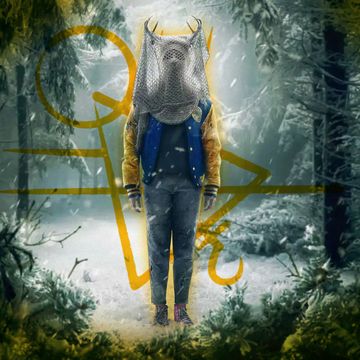We know Danielle Savre as Maya Bishop, the former Olympic gold medalist turned current lieutenant on the ABC hit Station 19. But Savre has been in the biz, as they say, for nearly her whole life, acting since she was 7 years old. She began working in commercials and print ads, and when she was 12, she got her first television role.
“I had a big personality,” Savre admits with a smirk.
Savre grew up in Simi Valley, California, with her mother and sister and from a young age, attracted a lot of attention. A notable early fan was Savre’s second-grade best friend’s mom, an assistant at the largest child talent agency at the time, run by Cindy Osbrink, which still operates today. Osbrink helped to launch the careers of many an extrovert kid, and given Savre’s gregariousness, it wasn’t long before she found herself in her own audition for the agency. On that fateful day, there were no parents allowed in the room, per Osbrink’s policy, which helped weed out the dreaded “stage mom” scenario.
“It was just me and Cindy in the room,” says Savre, “and I was this little, sassy, outgoing 7-year-old.”
It goes without saying, Savre nailed the audition, and she was soon signed to a two-year contract and booked her first job with Mattel. Then came Cabbage Patch dolls, My Little Pony, Polly Pocket, and Barbie ads. In television, she landed roles on Grounded for Life, Summerland, and Heroes. At last, in 2018, Savre found her way to Shondaland and was offered the role of Maya Bishop, an opportunity that has put her firmly on the Hollywood map. The role seemed somewhat kismet, given that Savre’s sister had already been working as a Los Angeles Fire Department firefighter for three years when Savre joined the fictional Station 19.
But Savre hasn’t exactly stopped there. In 2021, she also co-wrote and directed a short film, HEaRD, about a woman struggling with speaking out after experiencing a devastating trauma, and on May 4, she’s adding another line to her Station 19 résumé, making her TV directorial debut with the Station 19 episode “Dirty Laundry,” which follows the team as they respond to a horrific freeway pileup, as well as Andy, Natasha, and Ben, who are dealing with personal and professional fallouts.
“I want to do it all,” says Savre. “Directing and acting is more what I gravitate to versus writing, [but] I love coming up with ideas and sitting in rooms with writer friends and spitballing stuff. I would love to eventually develop more projects that focus on female empowerment and women in history. That is something that, obviously, everyone’s trying to make sure that we shed light on since so many stories have gone unspoken.”
Before the episode airs, Shondaland got to talk with Savre about Maya’s journey this season, what it was like to be a director on a major TV show, and how cool (and weird) it is to have a sister who’s a firefighter when you’re playing one on TV.
VALENTINA VALENTINI: Maya has had a tough go of it this season. What has it been like to kind of go on this downward spiral with her?
DANIELLE SAVRE: As an actor, it’s so rewarding. I’ve been given such amazing material to work with, and I think it’s such a valuable storyline to have. There are a lot of people out there who struggle with trying to be the perfect version of themselves, and it’s just unattainable. So, I enjoy the realistic aspect of the storyline and how they’re dealing with it, but then it’s also so much fun to have this much range to play with.
VV: Where is Maya at now?
DS: After the big breakdown, or breakthrough, I should say, with Diane [Tracie Thoms], it’s been about her coming to terms with who she is now. There haven’t been more therapy sessions on-screen, but we’ve seen Maya be challenged with the old Maya coming back up, figuring out how to balance wanting everything — being the captain, wanting the job, wanting the family life, looking for balance. Only time will tell how that will all pan out, though.
Maya and Carina [Stefania Spampinato] are rekindled and falling in love again, and learning how to date and learning to trust each other, specifically Carina learning to trust Maya again. And that’s not going to be something that’s easy to do. So, I’m glad that the show took their time to play out that storyline. I think it’s going to make everyone very happy. And me and Stefani are very happy to be able to do happy scenes together instead of a whole season of yelling and crying and being upset on camera because it’s the exact opposite of how we are off camera. It’s nice to go back to the old ways.
VV: How did directing come about? Did the producers and showrunner offer that, or did you ask?
DS: Oh, this has been five years in the making. I initially had talked about it with Paris Barclay, who used to be our directing producer, and he said to go for it. He told me to start shadowing, so I did. I shadowed directors Tessa Blake, DeMane Davis, Tom Verica, and Paris a couple of times, and Kevin McKidd on Grey’s Anatomy. I shadowed 12 separate times. And then I called [co-executive producer] Sara Fischer and asked, “Who do I talk to to make this happen?” And she told me to call [showrunner] Krista Vernoff. I called her and talked it through with Krista, who said her only stipulation is that I have to direct a short film. So, I was about to go into production with my short film when Covid hit. I was three days out from production starting, and as we know, the whole world shut down. It was a blessing in disguise, though, because then a year later I got to shoot the short, which actually gave me a year to work on the script. I wrote it with Tia Napolitano, who used to be one of the writers on Station 19 and is a dear friend of mine. I submitted it to film festivals, and it did an amazing job on the film festival circuit, winning awards and being a fan favorite with a lot of women’s festivals because it touches on women’s issues that we’re dealing with in the real world.
So, I did all that and thought I was going to direct during season five, but it got pushed until season six. I finally got the go-ahead, and I hope that they will entrust me with more episodes moving forward.
VV: They really made you work for it, huh?
DS: They did! But it was a good thing that they made me go out there and fight for it and work for it because in the process, I gained so much respect from the crew, from the writers, and I learned so much as a director. Shadowing only does so much, but getting out there and actually directing your own stuff, it was another blessing in disguise. At times, it felt like it was taking forever and that they’d never let me direct. But I’m grateful for the entire five-year journey.
VV: Set us up with the premise of the episode without giving anything away.
DS: It’s such a good episode. I got so lucky. It’s written by Emily Culver, and it touches on some very important subject matter. Josh Randall’s character, Beckett, comes back into the picture after being gone for four episodes after the death of a fellow firefighter, and he’s acting very strange, and everyone’s picking up on it, which will play out in the following episode. Jason George’s Warren is reeling from having to make basically a “Sophie’s choice” decision in the episode before — the choice between saving one person and another in a fire. I also got to shoot in the [Grey’s Anatomy] Grey Sloan ICU, which was amazing. My first episode, and I get to shoot at Grey Sloan! Well, we built it on our stage as a complete replica, which was still pretty surreal. And then there’s a huge incident, which the show doesn’t get a ton of these days. It’s a four-car pileup with a love story at the center. There’s an older couple who rekindled their love and just found each other again at 70, and there are two young teens that make a huge mistake and have to somehow move forward in their life after this horrible incident that happens. And then on top of that, the episode has a ton of female empowerment because it deals with the scandal of Chief Ross and Sullivan’s relationship coming out and the fallout from that. Andy really has her back.
VV: Wow, that’s a lot going on for your first time directing.
DS: It was. It was a lot of pressure too. I got the script, and I was like, “Emily [Culver, who wrote the episode], you are not going easy on me.” And it was a crazy process too: You have eight days of prep and then 10 days of filming, and during my prep, I shot an episode of Station 19 and two episodes of Grey’s. It’s been a whirlwind, but I got a huge episode that I am so happy about, and I hope everyone loves it.
VV: What was the experience like being the director on such an established and well-known TV show?
DS: I liked having answers and being decisive. I’m a little type A — Me and Maya are very different, but one thing we’re a little aligned on is that type A personality. So, being able to prep and put all the pieces together and come up with ideas and have answers for people, I really enjoyed seeing it all come to fruition and knowing that it was my vision. And everyone in our 300-person crew comes to me with all their ideas and questions, and being able to have answers or collaborate on things with the medical advisers and the fire tech, it was great to feel like part of the process. Sometimes as an actor you get lost in the element of “I’m just here to come in, say my lines, play this character, and leave.” You have no say in what’s written or filmed or edited. So, it felt good to play a more significant role in the process of making Station 19.
VV: It sounds like you loved it.
DS: I loved it! I’m going to live on the high from that for quite some time.
VV: Was there anything you didn’t like about it?
DS: There was nothing I didn’t like. I will say that when you have 10 days to shoot 50 pages, ideally you want to be shooting five pages a day, but sometimes scheduling doesn’t work out that way. There were some days where we had to shoot close to eight pages of dialogue, and those days were a little stressful, but we still had a blast. Everyone told me I handled it so calmly, and I was surprised because inside I was going crazy. I guess that’s one thing I can take away from it — I didn’t know until this situation that I was calm under pressure. So, that’s good. I took that away from it.
VV: We must ask, because it is just the craziest coincidence, about your sister being an LAFD firefighter. When you first got the role, what did she say?
DS: She was the first one I called because of the irony of the whole situation, and she didn’t believe it. I don’t usually tell family and friends about auditions because I’m a little superstitious when it comes to all of that, so she didn’t even know I was going up for Station 19. And then I booked it, and I called her, and I was like, “You’re never gonna guess what I just got cast as.” And she could not actually guess it. I said, “Stephanie, I’m playing a firefighter!” She had some choice words to include with “Are you blank blank kidding me?!” She was very shocked. But it’s been great because I can call on her for advice, and I feel like there’s a little bit more pressure to make sure I really represent female firefighters to the best of my ability because she is one.
VV: What does she think of your work as a firefighter or the show itself?
DS: She loves it. I mean, she has to sometimes come to the show’s defense because her fellow firefighters will point out things that are not accurate. And she’ll say, “Listen, if they filmed everything we did, it’d be totally boring.” But she loves the show, and she’s so proud of me, and I’m so proud of her. It’s a pretty crazy, surreal situation because there are only three shows that exist with female firefighters, and I’m on one of them, and my sister is one of the five percent of female firefighters in the LAFD. It’s pretty crazy.
VV: Has she given you any pointers, or have you called on her for advice at any point?
DS: Oh, yeah, on such a wide range of things. She has told me to make sure I use all the real tools. Because we have fake prop tools, and so I think that’s something that everyone knows if I’m going into our fake fires on the show, I’m always using real, heavy tools. But yes, I can call her and ask how to do something in a specific situation. I think it was the pilot episode when we did a scene where we had to jump out of a window. I asked her how she would’ve done it, and so I kind of came on to set with my ideas, and I think the fire tech was very impressed.
VV: Outside of Station 19, you’ve got some hobbies — I hear you’re getting your pilot’s license?
DS: I am! I’ve always loved flying. Two of my best friends have a small Piper Seneca, and I’ve flown with them for a long time. Finally, they were like, “You need to get your license.” This was about three years ago now, and it’s been a slow process — there’s only so many hours in every day — but yeah, I love flying; I love being up in the air. I’ve always been a little bit of an adventurer. I scuba dive as well. I guess I like to go to those unknown places deep in the ocean and up in the sky. Although I won’t skydive yet. I keep telling myself I have to, but I just can’t bring myself to jump out of a perfectly good plane.
VV: You’ve also committed to being an ambassador for the international nonprofit organization CARE. Tell us about why and what you do with them.
DS: I feel like everything in this conversation goes back to female empowerment, and yeah, why not? I love that. But CARE’s main thing as an organization is to empower women around the world. I gravitated towards that. In 2019, during season two, one of the writers, Angela Harvey, told me about this convention in Washington, D.C., she was going to go to, and she asked if I wanted to come. I was all in. I had been looking at organizations to be a part of, to really be hands-on with, and most organizations seemed to be more about just showing up to their red carpet and giving them money or helping them raise money by just being there. And I really wanted to be a part of something that was more hands-on and that gave me a voice in what they were doing.
In between season two and three, I went to D.C. to CARE’s fantastic convention, where all their ambassadors and anyone who wants can come to learn what CARE is working on, what bills they’re putting on the floor, what policies they’re pushing for with the congressmen and women in the Capitol. I sat there, and I asked a million questions, and Jonathan Young, the West Coast rep, gravitated towards me. He saw how engaged I was, so that June, I got to go to Capitol Hill, talk to my local congressman and women, and fight for the International Violence Against Women Act. It was so empowering, and it felt like the right thing to do. Not long after, they asked if I wanted to go see what they were doing on the ground in Zambia. I went and saw what they were doing in three small villages to empower women and young girls — they were building schools to help with the communities in those areas that really needed education; they were providing transportation to those schools; they were fighting against child marriage. It’s just an organization that, in my experience, is so transparent. I feel passionate about raising money for a company that I’m seeing firsthand the work they’re doing.
Valentina Valentini is a London-based entertainment, travel, and food writer and is also a senior contributor to Shondaland. Elsewhere, she has written for Vanity Fair, Vulture, Variety, Thrillist, Heated, and The Washington Post. Her personal essays can be read in the Los Angeles Times and Longreads, and her tangents and general complaints can be seen on Instagram at @ByValentinaV.
Get Shondaland directly in your inbox: SUBSCRIBE TODAY
